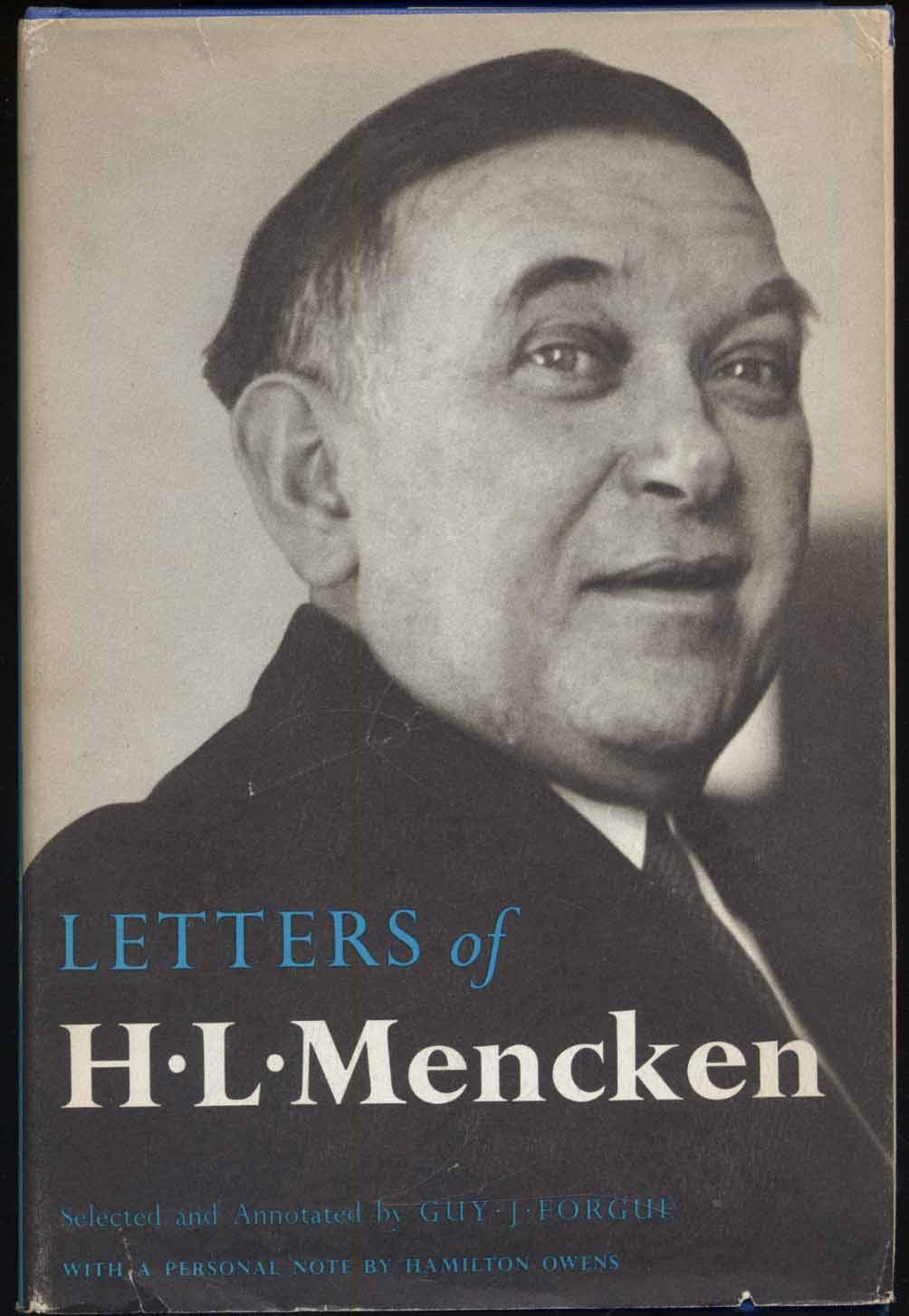Henry Louis Mencken may fairly be accounted the most consistent champion of individual liberty this country has ever seen. Coming to the fullness of his powers at a time when the nation first ventured into the role of international Messiah, and when it was giving, not the first, but probably the most extraordinary, exhibition of its capacity for fantasy thinking in national Prohibition, he laid about him with a zest which no one who lived through the Twenties can forget. And now that we are beset with equally great if not greater political grotesqueries (a phrase which I believe would have met his approval), those who long for an order of sanity and liberty may well echo the famous line of Wordsworth and cry, “Mencken, thou should’st be living at this hour.”
The recently published Letters of H. L. Mencken give an opportunity to refresh our memory of this vivid personality. What the reflective reader will discover here is another source of proof that Mencken was essentially a conservative critic of life and letters. Such estimate could amaze those who mistake his sweeping diatribes as evidence of a radical temper. But it is necessary to see things in the right relation: the features of American life which he attacked were radical aberrations from conservative common sense; his frequently violent criticisms showed a zeal, traditionally pardonable in any apostle of fairness, to expose folly, pretense, imposture, and self-promotion.
I have said common sense because it can reasonably be argued that Mencken was not a philosophical conservative. He never formulated a creed; he was skeptical of general truths; and the very notion of metaphysics was often the butt of his wit. In this department he was lacking, but there is a conservative of taste and temperament, and of this type he is an easily recognizable example. Taste and temperament bred a sure judgment for what is right in conduct and good in literature. Still, even the most instinctual conservative has some need of reliance upon ideas, and where Mencken does allow himself to express general views, he is conservative even by the philosophical test. He had definite convictions about the limited capacity of man, and a real personal humility, for which his purposely inflated rhetoric was but an ironic mask. The Letters abound in evidence on these points. He confesses in writing to Charles Green Shaw in 1927:
My belief is that happiness is necessarily transient. The natural state of reflective man is one of depression.
I have little belief in human progress. The human race is incurably idiotic. It will never be happy.
I hope to write at least one good book before I die.
If Mencken had what could be termed a political philosophy, this could be summed up as a belief in natural aristocracy. Such belief had not the slightest connection with snobbism; he felt sincerely that the maximum of liberty will prevail when the better element is in control, for they will effectively preserve a decent minimum of order, while allowing the remainder of mankind to be fools in their own way. Democracy to him meant plebeianism, which is the rule of the masses in the name of their vices. This is why he could write:
All appeals to any intrinsic love of free speech are futile. There is no such passion in the people. It is only an aristocracy that is ever tolerant. The masses are invariably cocksure, suspicious, furious, and tyrannical. This, in fact, is the central objection to democracy: that it hinders progress by penalizing innovation and nonconformity.
To that state of affairs anything was preferable, and in this light one must understand his occasional postures of indulgence toward societies that today would be called reactionary or authoritarian. Oddly enough, Mencken at one time became a contributing editor to the Nation, whose political reformism and crusading spirit were completely out of line with his convictions. A letter written to Louise Pound on the occasion contains a few political observations:
I have joined the Nation as a contributing editor. This is a joke, the significance of which rather escapes me. . . . My politics are anything but Liberal. I am a kaiserliche-königliche Tory, believe in slavery, and await patiently the restoration of the Hohenzollerns and the new Vormarsch upon Paris.
Every reader of Mencken will remember that among the liberties for which he contended most strenuously was that of imbibing stimulants, and many of his merriest sentences are on the subject of alcohol. On one occasion he rejected a manuscript sent in by Upton Sinclair with the following note:
I like the Jack London chapter very much, but its onslaughts upon alcohol make it impossible for us. We are committed to the revival of the saloon exactly as it was. America misses it and is much worse off for the lack of it. London, sober, would have written nothing worth reading. Alcohol made him.
And at the conclusion of the note:
Twenty barges in tow of five tugs set out from the Bahamas for Baltimore last Tuesday. It will be a Christian Christmas. God’s hand is in it!
But reverting to the more serious, one must remember that no sampling of this correspondence would be complete without some notice of his literary dicta. Here, for example, is a shrewd appraisal of Sherwood Anderson, expressed in a letter to Theodore Dreiser:
Anderson’s short stories often give me a great kick (as Scott Fitzgerald would say), but his novels usually seem a bit confused and muddy. I doubt that he has the sheer power to swing a long book. But his details are often superb.
His judgment of Thomas Wolfe, written at the time of the latter’s death, is now virtually the canon:
If he had lived five years longer, he’d have got rid of many of his defects.
The great vogue of Steinbeck’s The Grapes of Wrath inspired an acid note to H. L. Davis:
I have been reading Steinbeck’s “The Grapes of Wrath.” It seems to me to be a very poor job. It is full of pink hooey, and contains some very stilted and ineffective writing. . . . Steinbeck of course is getting encomiastic notices in the pink weeklies, but that is of no significance. They always praise any book that blames every bellyache on Wall Street.
It has been said many times that a humanitarian is one who loves humanity in the abstract, but hates it in the form of individuals. Of this type Mencken was the exact opposite; he despised the abstractions of humanitarianism, but he was always quick to go to the assistance of underdog individuals. No one can say how many struggling young authors he helped to fame, while jeering at the critical consensus. If men are to be judged by their deeds rather than by their professions of philanthropy, his accolade will be immeasurably greater than that of social doctrinaires, who have never learned the truth of William Blake’s saying that he who would do good to another must do so in “Minute Particulars.” The accumulation of these particulars was in Mencken’s case so great that he must stand as one of the greatest and the most helpful of this country’s rugged individualists.
Richard Weaver was a professor, historian, and author of many works, including Ideas Have Consequences (1948).
















